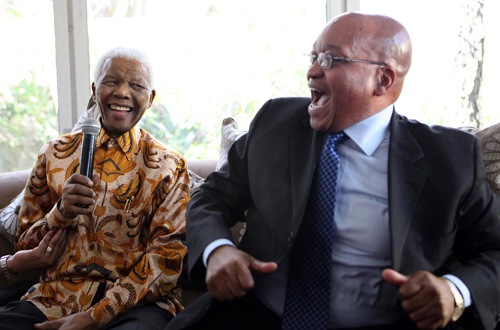|
 |
|
HAPPY BIRTHDAY: South African President Jacob Zuma (right) and former president Nelson Mandela celebrate the latter's 91st birthday on July 18, 2009 in Houghton, Johannesburg (XINHUA/AFP) |

South African President Jacob Zuma reflected on Nelson Rolihlahla Mandela's passing on December 5, saying, "Our nation has lost its greatest son. Our people have lost a father." The whole world expressed grief over the death of the 95-year-old former leader. Chinese President Xi Jinping, Premier Li Keqiang and the Chinese Ministry of Foreign Affairs sent their condolences to the South African people; U.S. President Barack Obama and UN Secretary General Ban Ki-moon delivered special statements; and the United States and Britain flew their flags at half-mast. Media throughout the world have been devoting time and space to reporting Mandela's legendary life and his outstanding contributions.
The world has shown such an outpouring of respect not just because Mandela was the founder of a democratic South Africa, but also due to the man's spirit and attitude of tolerance. His outlook stood beyond the limits of ordinary politicians, reflecting the common spiritual foundation of human beings. Mandela has fulfilled his 95-year-long journey. But his story and spirit will last forever. People will remember Madiba (Mandela's Xhosa clan name) as a historically great man and a leader of Africa and the world.
Realizing equality
Mandela was born into a tribal chief family in Transkei on July 18, 1918. Seeing and sensing black South Africans' painful and miserable lives under a racist white regime, Mandela refused to accept the assignment of chief heir, swearing to devote himself as a soldier for national liberation instead of being chief of a tribe under racial repression.
In 1944, 26-year-old Mandela joined the African National Congress of South Africa (ANC, today's ruling party of South Africa), and became chairman of the ANC Youth League in 1950. At the end of 1952, he successfully organized and led the Defiance Campaign, which opposed racist legislation. Though winning the respect and support of black South Africans, he was arrested by the white regime.
Mandela spent 27 years in prison from August 1962 to February 1990. His suffering inspired the international community to put pressure on the regime of white South Africans; his indomitable fighting spirit encouraged black South Africans to continue the campaign for racial equality until the ultimate victory. Despite ruthless persecution against him and his family, Mandela did not emerge from prison with a spirit of hate and revenge, but rather put hate aside. He cherished the ideal of realizing a democratic society, while criticizing any form of racial discrimination, whether it came from whites or blacks.
He promised that the ANC would never take vengeance against the racial discrimination of the past after it became the ruling party. Mandela made a statement at court on April 20, 1964, when he was sentenced to life imprisonment: "During my lifetime I have dedicated myself to this struggle of the African people. I have fought against white domination, and I have fought against black domination. I have cherished the ideal of a democratic and free society in which all persons live together in harmony and with equal opportunities. It is an ideal which I hope to live for and to achieve. But if needs be, it is an ideal for which I am prepared to die."
During his decades-long anti-apartheid movement Mandela iterated that the campaign for national liberation is not a fight against any organization or race, but a war against a system of oppression. Thus, he adjusted the ANC's strategic guideline and tactics, triumphing in the country's non-violent transformation through peaceful negotiation and reconciliation. For this, he was awarded the Nobel Peace Prize in 1993 together with South African President Frederick Willem de Klerk.
Everlasting spirit
Mandela was elected as the first black South African president in April 1994 in the first ever presidential election in South African history. He refused to take a second term when his first term ended in June 1999, setting a good example for his successors and other African leaders while cementing the democratic constitutional basis of the new South Africa. Mandela's conception of tolerance and reconciliation and his insistence on building a democratic country based on racial equality formed the Rainbow Nation.
The concept of reconciliation, which calls for forgiveness and tolerance, is the essence of Mandela's spirit. Mandela said upon his release in February 1990 that if he couldn't leave pain and hatred behind, he would still be in prison. His tolerance taught the world a lesson in forgiveness. South African Archbishop Desmond Tutu, another Nobel Peace Prize winner, called Mandela a global symbol of reconciliation.
Mandela established the Truth and Reconciliation Commission in November 1995. The commission targeted the realization of reconciliation, not revenge, through identifying the truth of apartheid. The Mandela spirits not only appropriate for solving deep-rooted racial conflicts, but also settlement of any conflict and dispute in the world.
Mandela was not obsessed with power, as evidenced by the fact that he did not seek a second presidential term, but he never stopped contributing to world peace. He mediated the civil war in Burundi to push forward peace in Africa. He also established foundations, so as to build schools in rural areas and to fight AIDS, which seriously plagues and hinders the economic and social development of the continent.
Mandela's spirit and influence have spread to the whole world, and he has become a symbol that will last forever. The 64th UN Assembly passed a resolution in 2009, appointing July 18—Mandela's birthday—as Nelson Mandela International Day to recognize his contribution to world peace and freedom. UN Secretary General Ban said when addressing Nelson Mandela International Day on July 18, 2009, "Through long years in prison, he maintained a steadfast belief in justice and human equality. Upon his release, he reconciled with those who persecuted him most, and he led the way toward a democratic, multi-racial South Africa. To this day, he works tirelessly for peace and human dignity throughout the world. His engagement in the fight against AIDS broke new ground against stigma. He is an exemplary global citizen."
The author is a senior research fellow at the Charhar Institute as well as researcher with the Institute of West-Asian and African Studies under the Chinese Academy of Social Sciences
Email us at: liuyunyun@bjreview.com | 